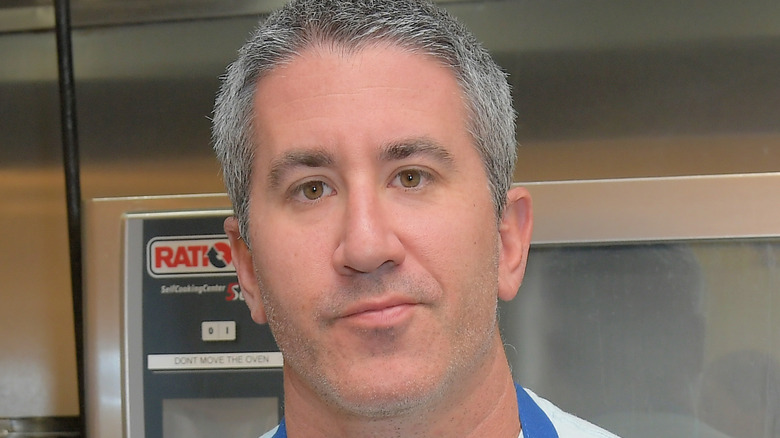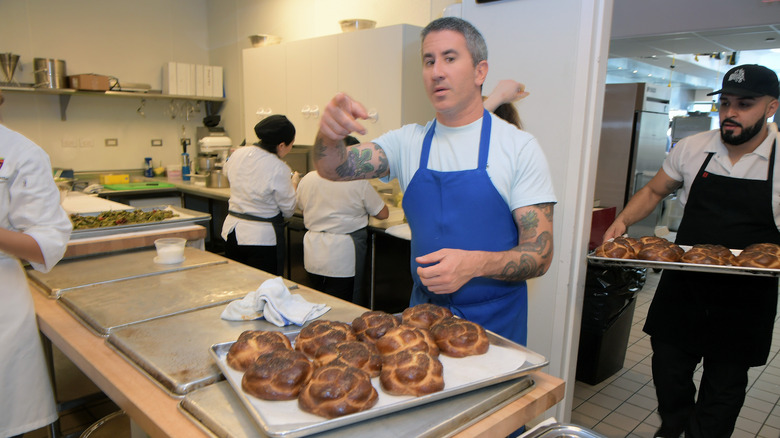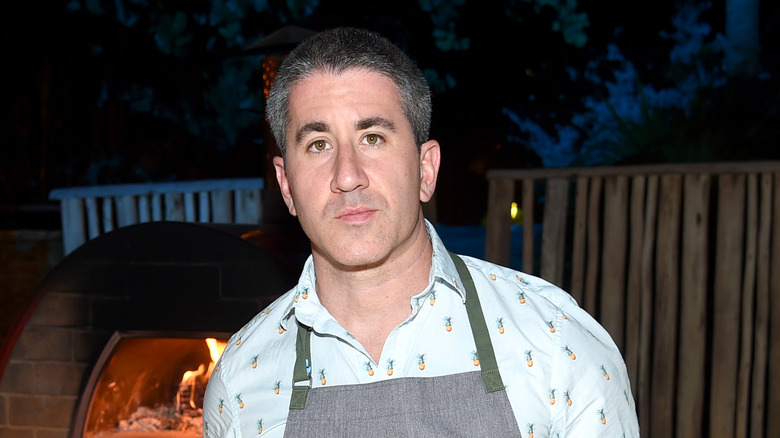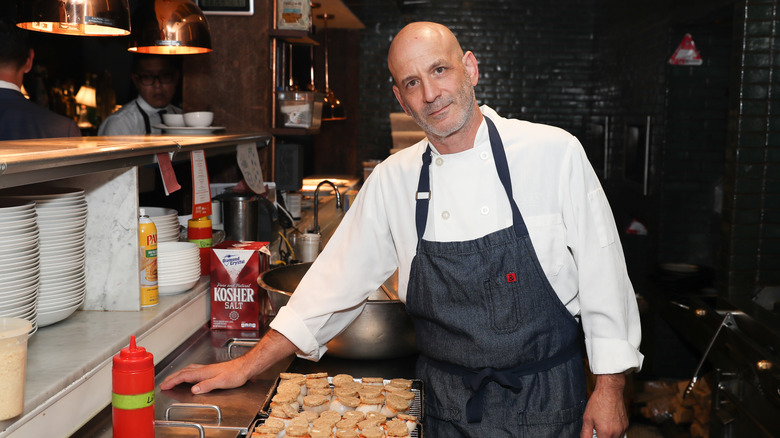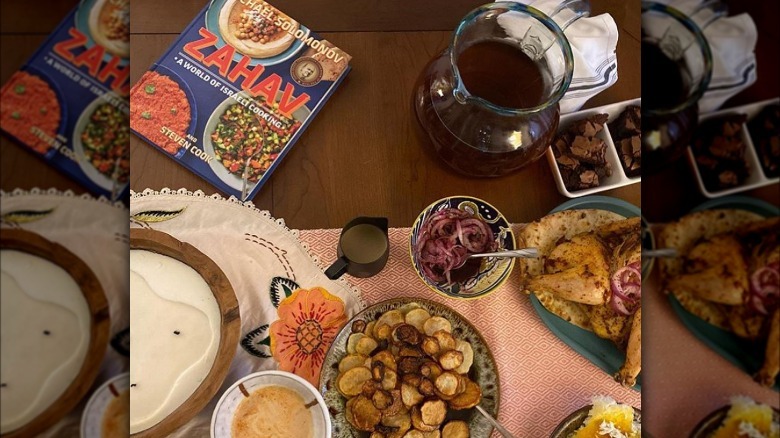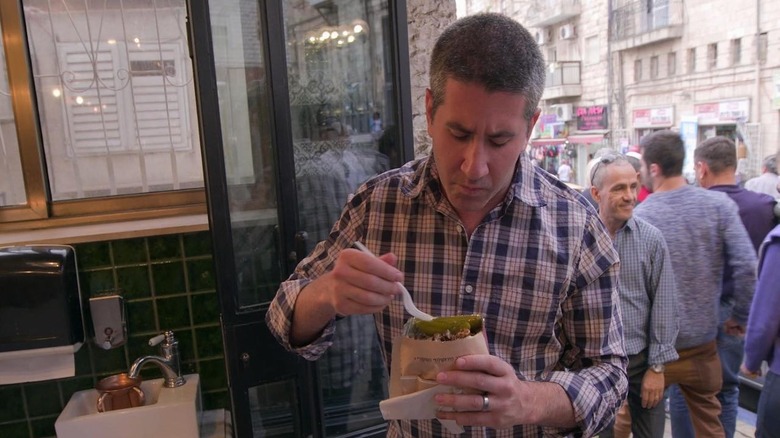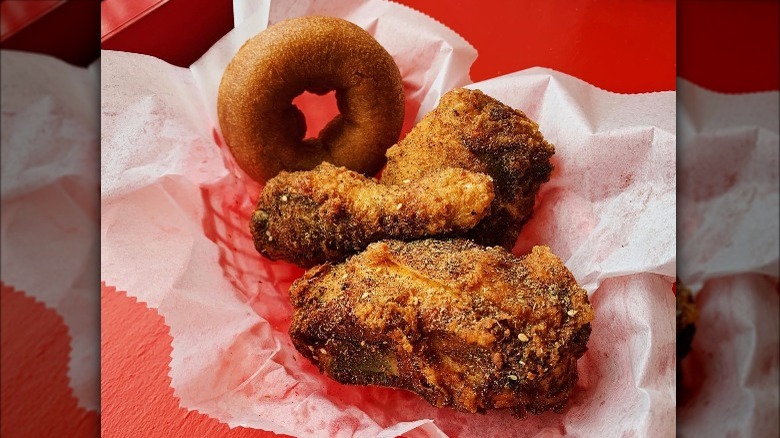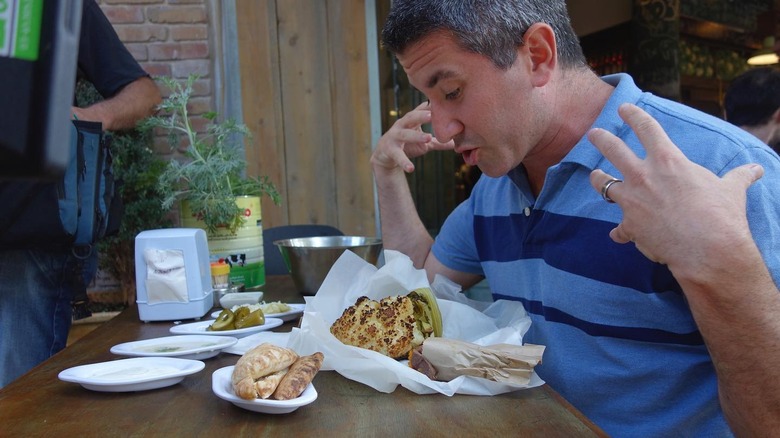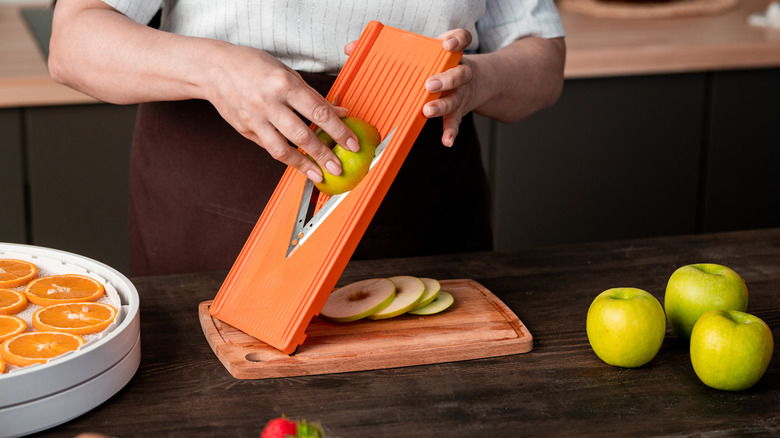The Untold Truth Of Mike Solomonov From Where Chefs Eat
It wasn't that long ago that Israeli cuisine was barely a blip on the radar of the American dining scene, particularly in fine dining circles. Then came along Mike Solomonov and his restaurant Zahav, which showed this country how transformative the flavors of that region can be when they're applied to exquisite ingredients. You don't earn a bunch of James Beard awards and show up multiple times on Eater's list of essential restaurants without doing something right, and Solomonov has certainly accomplished that with Zahav, his passion project.
But there's so much more to Solomonov than just one restaurant. He's got quite a few businesses now, ranging from a fried chicken and donut chain to a falafel shop to a bakery (via CookNSolo). He's also a tireless advocate and booster for the cuisine he loves, using his platform to promote the flavors that excite him. Despite his numerous accolades, however, he's still not one of the most famous celebrity chefs around. Let's try to take a step to correct that by delving into the untold truth of Mike Solomonov.
Mike Solomonov was born in Israel, but left as a baby
Although Mike Solomonov was born in Israel and is now one of the United States' most notable Israeli chefs, he took a circuitous path towards learning the flavors of his homeland. Per his biography on Zahav's website, Solomonov's family left his birthplace, G'nei Yehuda (which according to StarChefs is near Tel Aviv), when he was a baby. He grew up in Pittsburgh, but his family moved back to Israel when he was 15.
The chef told NPR that the transition was tough for him, as he didn't understand Hebrew and hated having to move so far from the only home he could remember. He rebelled and quickly went back to the States, where according to StarChefs, he briefly attended the University of Vermont, not finishing his degree. It was only when he returned to Israel at 18 that he began his food career in earnest, accepting a job at a traditional bakery which was the only place that would hire him due to his lack of Hebrew. It turned out that he loved cooking, and the rest is history.
His brother's death inspired him to become an Israeli chef
Mike Solomonov's life was indelibly shaped by the influence of his brother David, who was tragically killed at age 21 by a sniper while he was serving in the Israeli Defense Forces (via Pittsburgh Magazine). Before his death, David introduced Mike to many Israeli dishes when Mike would come to Israel for visits. The two brothers traveled across the country, sampling a variety of the foods that Israel has to offer.
Solomonov says that his intense love for Israeli cuisine started with those trips with his brother. Although the chef was already working in the food industry at the time of his brother's death, he wasn't cooking any Israeli food. Per NoCamels, after David died, Solomonov decided to hone his Israeli cooking skills. After meeting business partner Steve Cook, he was able to open his dream Israeli restaurant, Zahav, in 2008. More recently, the chef dedicated an episode of his webseries, "Bringing Israel Home," to his brother's memory.
Mike Solomonov worked under Philly celebrity chef Marc Vetri
As we hinted at earlier, Mike Solomonov wasn't always destined to become a chef who specializes in Israeli cuisine. Although his first cooking job was at a bakery in Israel, he moved back to the United States after he decided he wanted to pursue kitchen work long-term. According to StarChefs, he honed his skills at culinary school in West Palm Beach, Florida, before moving up to Philadelphia to work in restaurants.
While in Philadelphia, he spent several years working in Chef Marc Vetri's family of upscale Italian restaurants. If Vetri's name sounds familiar to you, it might be from his appearance on "Iron Chef America," or because he famously partnered with Urban Outfitters. StarChefs notes that after his tenure under Vetri, Solomonov took a job as the chef at businessman Steve Cook's Marigold Kitchen.
That job proved to be the beginning of a long and fruitful business partnership. After Marigold, the duo opened the upscale Mexican place Xochitl, and then Zahav. Now their restaurant group, CookNSolo, operates eight different restaurant brands and plans to open an event business.
His breakthrough restaurant almost failed
Mike Solomonov presides over an empire now, and he owes much of his success to Zahav, his first Israeli restaurant. The place is an institution at this point, and it's incredibly difficult to get a reservation there. However, despite Zahav's current rarified place in America's culinary scene, the restaurant's success wasn't a forgone conclusion. Anyone with a passing familiarity with the industry knows that the hospitality business can be brutal, and having a world-class chef and a great concept isn't always enough to overcome the harsh economics of running a restaurant.
When Zahav opened in 2008, the Great Recession was just getting under way, and the resultant wallet tightening led to the new restaurant doing dismal business (via The Atlantic). It got so bad that Zahav was on the brink of closing down for good, but help came at the 11th hour from an unexpected source. Esquire called Zahav one of America's best new restaurants, and the resultant publicity turned the Philadelphia eatery's fortunes around almost overnight.
He was addicted to crack and heroin while opening Zahav
Being the executive chef at a restaurant, especially a new restaurant, is an incredible amount of work. Between the long hours, the physically-demanding labor, and the constant mental stress, you have to give your all every single day. When he opened Zahav, Mike Solomonov had to struggle with all of that while simultaneously dealing with twin addictions to crack and heroin (via NPR). Solomonov describes himself during this period as a "talented actor," able to put on an outward show of competence while internally, his life was falling apart. According to The Atlantic, at the same time he was struggling to get Zahav off the ground, he was regularly smoking crack behind the wheel of his car and driving while high.
Fortunately for Solomonov, he had a strong support system of people who loved him and were able to get him out of this situation. His business partner Steve Cook and his wife intervened and sent him to rehab. In the first year of his recovery, he never allowed himself to be alone in the car, taking rides from Cook or from his wife, and never carried money. Even with their help, the chef told NPR that maintaining sobriety is an ever-evolving process that requires constant vigilance.
If you or anyone you know is struggling with addiction issues, help is available. Visit the Substance Abuse and Mental Health Services Administration website or contact SAMHSA's National Helpline at 1-800-662-HELP (4357).
Fried chicken and donuts helped expand his culinary empire
Although Israeli food made Mike Solomonov's reputation, it's not the only thing he's good at. One of his most successful ventures is Federal Donuts, a small fast-casual chain with a very stripped-down menu. At Federal Donuts, they specialize in crispy double-fried chicken, scratch-made donuts, and coffee. In a nod to more recent fast-food crazes, they have also introduced a fried chicken sandwich that might even be better than Popeyes. According to Eater, the chain was an instant success, inspiring huge lines and selling out of product almost instantly when it first opened.
The chicken recipe is based on Korean fried chicken, and has the same shatteringly crunchy exterior as its inspiration. The donuts are all of the cake variety, and they come in a rainbow of interesting flavors. Although neither item is particularly Israeli, Solomonov can't help but include a nod to his culinary heritage in Federal's food. Both the donuts and the chicken are spiced with seasonings from Israeli-American spice merchant Lior Lev Sercarz, and the donut batter features baharat, a warm-tasting Middle Eastern spice blend.
Mike Solomonov likes simple food
Mike Solomonov owns several trendy restaurants and has a prestigious culinary pedigree, but don't let that make you think he's a snob. In fact, the foods he likes the best are often the simplest. As he discusses with NPR, he finds it very impressive when very basic dishes with minimal ingredients are prepared very well. That's why he obsesses over things like creating the perfect Persian rice with a crispy toasted bottom, or crafting ethereally creamy hummus (though he's perfectly fine with eating store-bought hummus too, and even has it in his fridge at home).
He's also very inspired by the humble street food he eats during his frequent trips to Israel. Three dishes that he highlights in the NPR interview are shawarma, falafel, and sabich, a pita sandwich filled with fried eggplant, eggs, tehina, and pickled mango. He's also a fan of Middle Eastern-style grilled meats, including a grilled mixed offal sandwich that's a specialty in Jerusalem.
Mike Solomonov's first TV appearance was a disaster
Mike Solomonov looked like a television pro when he gave Ted Allen a chef-centric tour of Philly on "Where Chefs Eat" (via Philly Voice). Like anything else, being on TV is a skill that takes practice, and the chef's first foray on the small screen didn't go so smoothly.
Solomonov told The Splendid Table that his first TV appearance was on a morning program. He had two and a half minutes to give a cooking demonstration and show off some of his dishes. He made the strategic error of opening the segment by shaving celery on a mandoline, a notorious cutting device that has claimed the fingertips of many chefs over the years. The predictable happened, and Solomonov immediately cut off the tip of his thumb on live TV. A true kitchen pro, the chef immediately wrapped his thumb in a towel and hid his gory hand behind his back. He was able to finish the segment and talk about his food, which is quite impressive under those circumstances.
He started a web series during the pandemic
The pandemic left many of us with a lot of time on our hands and nowhere to go. We used that extra time to pick up new hobbies and cook more at home. Who among us didn't try our hands at making a sourdough starter or fixing a bowl of pancake cereal?
It turns out that famous chefs are no more immune from pandemic tropes than the general population is. While you might think that cooking at home wouldn't be a new thing for a chef like Mike Solomonov, he's a busy guy with a lot on his plate, and he told NoCamels that the pandemic gave him more time to cook at home than he ever had before. The pandemic also left him unable to travel to Israel, a place he misses dearly. He combined his enthusiasm for his birth country with his newfound love for home cooking to make the web series "Bringing Israel Home," which premiered in early 2021.
In the show, he invites special guests to talk about different facets of Israel and shares Israeli recipes. It's a way for him to get back in touch with his birthplace while abiding by the restrictions imposed by the pandemic. There are 16 episodes, all of which are available on Vimeo.
He made a movie about Israeli food
It seems as though Mike Solomonov is trying to become the king of all food media. In addition to his cookbooks, his appearances on the small screen, and his web show, he also made a movie celebrating Israeli food. The film, a documentary called "In Search of Israeli Cuisine," follows Solomonov as he travels around Israel eating food and talking to people about how the region's unique cuisine has developed (via Menemsha Films). The chef visits farms, bustling marketplaces, factories, and families' home kitchens in an effort to grasp what makes Israel's food scene so special.
In an interview with the New York Times promoting the film, Solomonov talks about some of the themes that the documentary explores. He argues Israel's status as a home for people in the Jewish diaspora whose food traditions come from all over the world makes the country's cuisine particularly diverse. He also sings the praises of the produce and ingredients you can buy there.
Mike Solomonov invented a new kind of milkshake
Milkshakes have been around for awhile. You would expect that any earth-shattering innovations in milkshake technology would have already been developed by now, but it seems that culinary progress can happen at any time.
As Mike Solomonov explained to The Splendid Table, when he started Goldie, his fast-casual falafel restaurant, he wanted to make everything plant-based. That meant that he had to come up with a creative solution if he wanted to put a milkshake on the menu, as regular milkshakes are obviously heavy on the dairy. His idea for a vegan milkshake was ingeniously simple: a chilled mix of tehina (commonly known as tahini), almond milk, and sugar. Blended together, the ingredients make a deliciously creamy, sweet treat.
A quick perusal of Goldie's menu shows that in addition to the now-classic original flavor, the restaurant also offers versions flavored with coffee, mint-chocolate, and banana (though the options might change over time). If you're not lucky enough to live in Philly and can't visit Goldie, you can make your own tehina shakes at home with the recipe Solomonov shared with The Splendid Table.
He's got a pile of James Beard awards
For such a down-to-earth guy, Mike Solomonov sure has gotten a lot of bling from the James Beard Foundation. If he keeps on going at this pace, he's going to have to build a bigger mantel to hold all the awards.
Per Zahav's website, Solomonov's first James Beard Award came in 2011, when he won Best Chef, Mid-Atlantic. He won one for International Cooking in 2016, and one for Outstanding Chef in 2017. In 2019, Zahav took home the award for Outstanding Restaurant.
The chef has earned accolades as an author in addition to all the recognition he's received for his restaurant. Solomonov and Steve Cook shared the 2016 James Beard Award for Outstanding Book for the cookbook "Zahav: A World of Israeli Cooking." The book shows you how to cook many of the recipes that turned the restaurant into a sensation, from hummus to roasted lamb shoulder to pink lentil soup.
He showed Ted Allen hidden Philly gems on 'Where Chefs Eat'
You might think that Ted Allen is busy enough hosting "Chopped," but apparently he has time to host a food travel show as well. The show, "Where Chefs Eat," features the former "Queer Eye" personality visiting various cities and eating at places that are favorites of local food professionals. The first episode, which aired in December 2021, was set in Philly, and Allen's tour guide was none other than Mike Solomonov (via Philly Voice).
The places Solomonov took Allen to showed the breadth and diversity of the contemporary Philly food scene, giving viewers a deep look at what makes the city's food so special. Thai, Filipino, and Japanese cuisines were all represented, but the eatery that spoke most to Philly's traditions was Siddiq's Real Fruit Water Ice. The business started in 1995 as the brainchild of Siddiq Moore, who was then a student at Philadelphia's Temple University. His idea to update the refreshing Philly treat (that you may know as Italian ice) with real fruit instead of artificial syrups has been a runaway success, and his business now has a street named after it.
